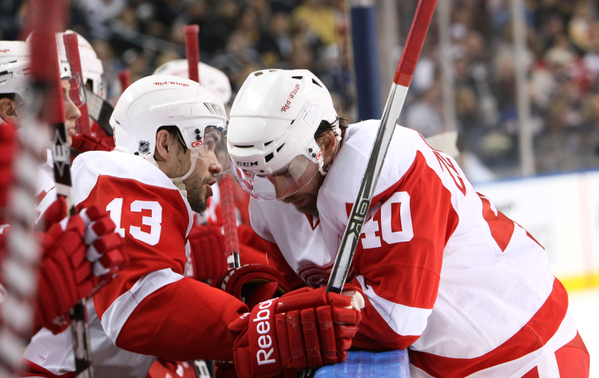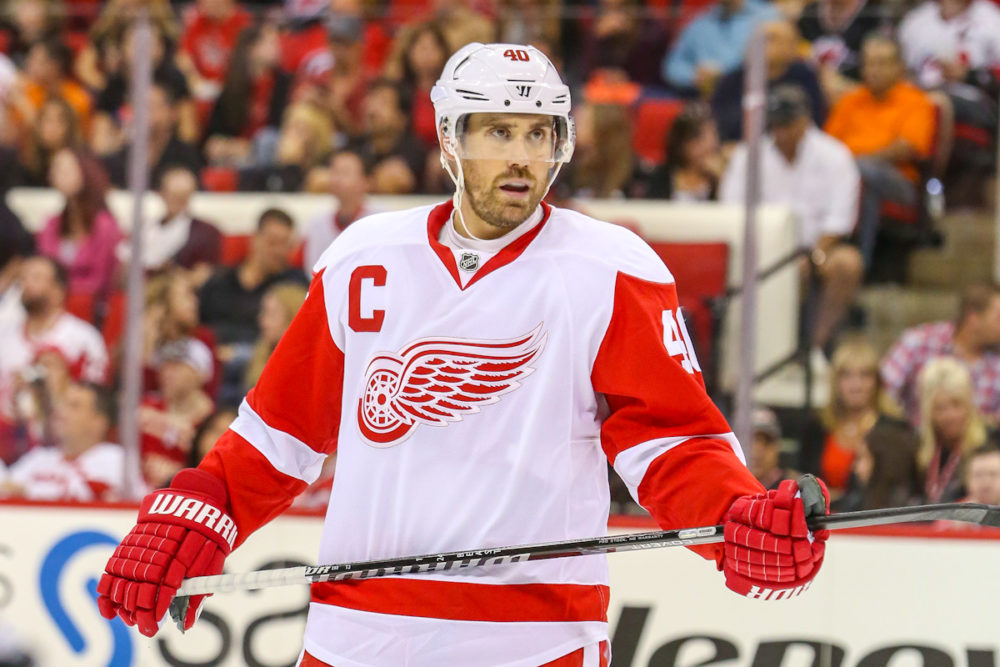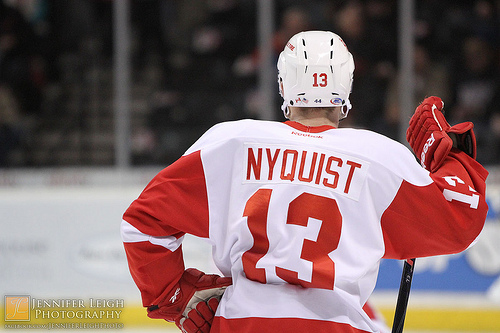
The players who ensured Detroit’s survival in the post-Yzerman era are both injured.
Without Datsyuk and Zetterberg the Red Wings are forced to stomach an appetizer for a meal we all knew was cooking in some revolting crock pot: life without numbers 13 and 40.
This is bad. This is so bad. The collective PTSD Detroit suffers from, resulting from that nightmarish losing streak, is waning but not gone. A fragile four game win streak separates the Red Wings from that recent calamity. A win streak that just got a hell of a lot more fragile. This, my fellow puck-snobs, is a test, to say the least.
What do we do now? It’s true Detroit has won since Datsyuk’s injury, but with Zetterberg hurt too? The Red Wings have found secondary scoring in a big way, but how much can that matter without the players required for primary scoring? Zetterberg made it clear with his remarks yesterday morning that back injuries are a life long problem, a problem that can unexpectedly flare up with little warning. And the stagnant, limbo-like nature of Datsyuk’s concussion makes one think of the uncertainty Penguins fans endured during the Crosby saga.
Again, this is bad.
“Scoring by committee” is a cliché term we in Detroit will be hearing for the foreseeable future. The skill to get it done is there, and the previous six games give the impression that the will is there too. But what can the Wings do to increase their chances of surviving the next…who knows how long?
Two words: Swarm intelligence.

Fools can get on Wikipedia and edit articles, but users will not find that D-Day took place on Halloween or that Einstein was born in Cleveland or anything like that. Wikipedia is fairly reliable, if you check citations and think skeptically. It’s also a decent tool for bloggers when we care to “instruct” and not just pontificate as if our opinions were terribly important. So now that I’ve paid tribute to Wikipedia, let me tell you why.
Hive-mind is one of my favorite terms. It sounds way cooler than “by committee” or “collectively.” I Googled “hive-mind” when I started to think about this piece, searching for some inspiring idea or fact. That’s when I came across swarm intelligence:
Swarm intelligence (SI) is the collective behavior of decentralized, self-organized systems, natural or artificial. The concept is employed in work on artificial intelligence. The expression was introduced by Gerardo Beni and Jing Wang in 1989, in the context of cellular robotic systems.[1]
SI systems consist typically of a population of simple agents or boids interacting locally with one another and with their environment. The inspiration often comes from nature, especially biological systems. The agents follow very simple rules, and although there is no centralized control structure dictating how individual agents should behave, local, and to a certain degree random, interactions between such agents lead to the emergence of “intelligent” global behavior, unknown to the individual agents. Natural examples of SI include ant colonies, bird flocking, animal herding, bacterial growth, and fish schooling. The definition of swarm intelligence is still not quite clear. In principle, it should be a multi-agent system that has self-organized behaviour that shows some intelligent behaviour.
The application of swarm principles to robots is called swarm robotics, while ‘swarm intelligence’ refers to the more general set of algorithms. ‘Swarm prediction’ has been used in the context of forecasting problems.
I understood very little of the above passage when I first read it, but after a few re-readings, it began to make some sense. It started to sound like good old fashioned team work. But I read on and found something particularly interesting in the paragraph on the Artificial Bee Colony Algorithm (ABC):
Artificial bee colony algorithm (ABC) is a meta-heuristic algorithm introduced by Karaboga in 2005,[5] and simulates the foraging behaviour of honey bees. The ABC algorithm has three phases: employed bee, onlooker bee and scout bee. In the employed bee and the onlooker bee phases, bees exploit the sources by local searches in the neighbourhood of the solutions selected based on deterministic selection in the employed bee phase and the probabilistic selection in the onlooker bee phase. In the scout bee phase which is an analogy of abandoning exhausted food sources in the foraging process, solutions that are not beneficial anymore for search progress are abandoned, and new solutions are inserted instead of them to explore new regions in the search space. The algorithm has a well-balanced exploration and exploitation ability.
The “scout bee phase” doesn’t sound much different from Detroit’s current predicament. For the record, what follows below is pure pseudo-science:
The injuries to Datsyuk and Zetterberg are an “exhausted food source” that requires “new solutions.” However, these new solutions require a scout bee to find them. So, who will be the scout bee for Detroit? Gustav Nyquist seems to be a logical answer. Tomas Tatar, Darren Helm and Johan Franzen are other possibilities. It’s takes an enormous amount of optimism to view the injuries to Datsyuk and Zetterberg as an opportunity. I’m inclined to think of it as a depressing shit-sandwich. But the opportunity for a new leader in Detroit has arrived, albeit early, so let’s see how this ridiculous bee experiment plays out.

All of this bee-talk is an analogy for computer algorithms but analogies are used so laymen can try to understand weird, mind-bending things. How Detroit can overcome these panic-inducing injuries is a weird and mind-bending problem, but one that can and must be solved.
Again, who will be our scout bee?